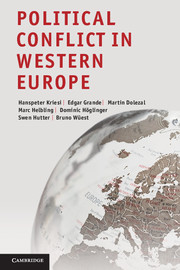Book contents
- Frontmatter
- Contents
- List of Figures
- List of Tables
- Preface and acknowledgments
- Part I Theory and methods
- Part II The development of the ‘integration–demarcation’ cleavage
- Part III Public debates: the articulation of the new cleavage in detail
- 8 The impact of arenas in public debates over globalization
- 9 Culture versus economy: the framing of public debates over issues related to globalization
- 10 Actor configurations in the public debates on globalization
- Part IV Conclusion
- References
- Index
8 - The impact of arenas in public debates over globalization
Published online by Cambridge University Press: 05 August 2012
- Frontmatter
- Contents
- List of Figures
- List of Tables
- Preface and acknowledgments
- Part I Theory and methods
- Part II The development of the ‘integration–demarcation’ cleavage
- Part III Public debates: the articulation of the new cleavage in detail
- 8 The impact of arenas in public debates over globalization
- 9 Culture versus economy: the framing of public debates over issues related to globalization
- 10 Actor configurations in the public debates on globalization
- Part IV Conclusion
- References
- Index
Summary
Introduction
In the preceding chapters we analysed how the impact of globalization restructured electoral and protest politics – two political arenas occupied mainly by political parties and social movement organizations. Struggles over national boundaries, however, take place in a larger range of arenas and involve a wider array of actors. To address this broader scope of political conflict related to globalization, we look at the integration–demarcation cleavage from a different perspective in this third part of our volume. More specifically, we switch from an analysis of specific arenas to a comprehensive analysis of public debates, which encompasses all potentially relevant arenas and actors and focuses on the three issues central to the new cleavage, namely immigration, economic liberalization, and European integration.
A public debate includes all communication related to a particular issue and is therefore independent of the arena in which it occurs. A public debate is the sum of all public communication related to a particular issue in a process of argument and counter-argument. This definition is close to what Ferree et al. (2002: 9) call ‘public discourse’: ‘public communication about topics and actors related to either some particular policy domain or to the broader interests and values that are engaged’.
- Type
- Chapter
- Information
- Political Conflict in Western Europe , pp. 207 - 228Publisher: Cambridge University PressPrint publication year: 2012
- 5
- Cited by

